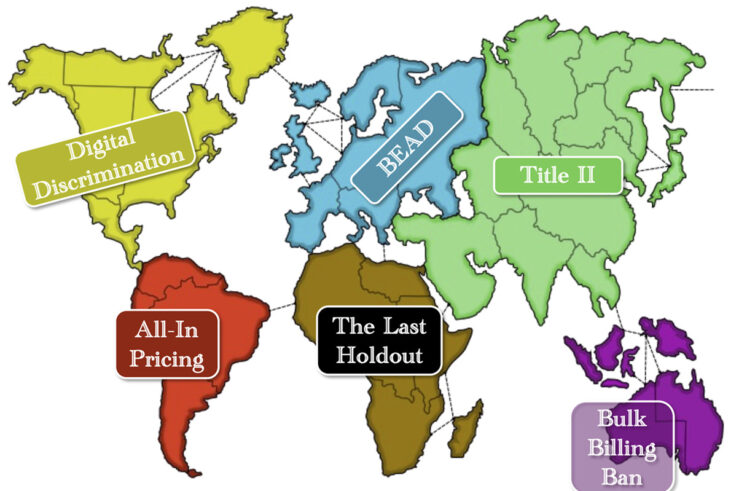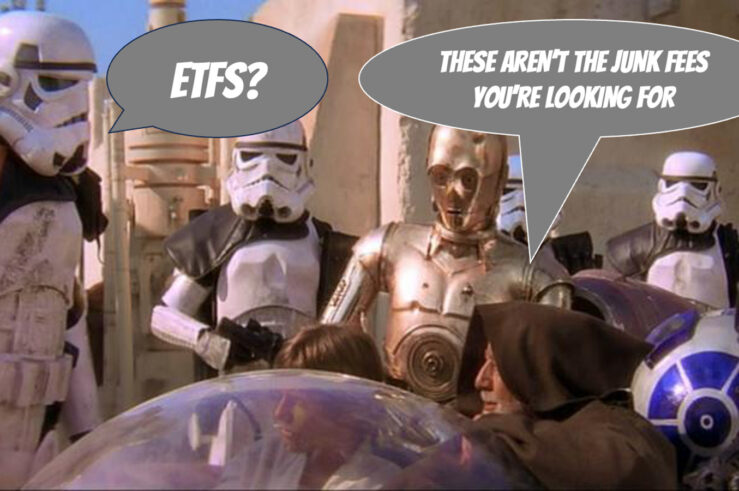Showing archive for: “Telecom”
How This Supreme Court Term Might Affect the FCC’s Digital-Discrimination Rule
The recently completed U.S. Supreme Court session appears to have upended the administrative state in some pretty fundamental ways. While Loper Bright’s overruling of Chevron attracted the most headlines and hand-wringing, Jarkesy will have far-reaching effects across both the executive and judicial branches. Even seemingly “small” matters such as Ohio v. EPA and Corner Post ... How This Supreme Court Term Might Affect the FCC’s Digital-Discrimination Rule
The View from the United Kingdom: A TOTM Q&A with John Fingleton
What is the UK doing in the field of digital-market regulation, and what do you think it is achieving? There are probably four areas to consider. The first is that the UK’s jurisdiction on mergers increased with Brexit. The UK is not subject to the same turnover threshold as under European law, and this enables ... The View from the United Kingdom: A TOTM Q&A with John Fingleton
The View from Canada: A TOTM Q&A with Aaron Wudrick
Aaron, could you please tell us a bit about your background and how you became interested in competition law and digital-competition regulation? I’m a lawyer by profession, but have taken a somewhat unconventional career path—I started as a litigator in a small general practice in my hometown outside Toronto, moved on to corporate law with ... The View from Canada: A TOTM Q&A with Aaron Wudrick
Clearing the Telecom Logjam: A Modest Proposal
In this “Age of the Administrative State,” federal agencies have incredible latitude to impose policies without much direction or input from Congress. President Barack Obama fully pulled off the mask in 2014, when he announced “[w]e are not just going to be waiting for legislation,” declaring “I’ve got a pen, and I’ve got a phone.” ... Clearing the Telecom Logjam: A Modest Proposal
The View from Australia: A TOTM Q&A with Allan Fels
Allan, you have a remarkably high public profile in Australia and are known to most of the Australian population as ex-ACCC chair. Could you please give us a bit on your background and how you got into competition law? I did degrees in law and economics at the University of Western Australia and a PhD ... The View from Australia: A TOTM Q&A with Allan Fels
It’s Risk, Jerry, The Game of Broadband Conquest
The big news in telecommunications policy last week wasn’t really news at all—the Federal Communications Commission (FCC) released its proposed rules to classify broadband internet under Title II of the Communications Act. Supporters frame the proposed rules as “net neutrality,” but those provisions—a ban on blocking, throttling, or engaging in paid or affiliated-prioritization arrangements—actually comprise ... It’s Risk, Jerry, The Game of Broadband Conquest
Section 214: Title II’s Trojan Horse
The Federal Communications Commission (FCC) has proposed classifying broadband internet-access service as a common carrier “telecommunications service” under Title II of the Communications Act. One major consequence of this reclassification would be subjecting broadband providers to Section 214 regulations that govern the provision, acquisition, and discontinuation of communication “lines.” In the Trojan War, the Greeks ... Section 214: Title II’s Trojan Horse
Blackout Rebates: Tipping the Scales at the FCC
Cable and satellite programming blackouts often generate significant headlines. While the share of the population affected by blackouts may be small—bordering on minuscule—most consumers don’t like the idea of programming blackouts and balk at the idea of paying for TV programming they can’t access. Enter the Federal Communications Commission (FCC) with a bold proposal to ... Blackout Rebates: Tipping the Scales at the FCC
FCC’s Digital-Discrimination Rules: An Open Invitation to Flood the Field with Schlock
A half-dozen lawsuits have been filed to date challenging the digital-discrimination rules recently approved by the Federal Communications Commission (FCC). These cases were consolidated earlier this month and will now be heard by the 8th U.S. Circuit Court of Appeals. This has the hallmarks of a significant case that will almost certainly involve the U.S. ... FCC’s Digital-Discrimination Rules: An Open Invitation to Flood the Field with Schlock
Are Early-Termination Fees ‘Junk’ Fees?
Cable and satellite companies often get a bad rap for early termination fees (ETFs). Consumer advocates portray them as “junk fees” or billing traps meant to cheat customers. And the Federal Communications Commission (FCC) appears to accept these allegations at face value, characterizing ETFs as “junk fee billing practices … that penalize subscribers for terminating ... Are Early-Termination Fees ‘Junk’ Fees?
The Curious Case of the Missing Data Caps Investigation
In an announcement that was treated to mild fanfare (meaning it was reported by certain tech blogs, but largely ignored elsewhere), Federal Communications Commission (FCC) Chair Jessica Rosenworcel asked her fellow commissioners in June 2023 to support a formal notice of inquiry (NOI) to learn more about how broadband providers use data caps on consumer ... The Curious Case of the Missing Data Caps Investigation
Slouching Toward Disconnection and the End of the ACP
It’s our first post of the New Year, and we’re having a hard time feeling the Hootenanny vibes. Rather than Congress taking a “new year, new you” approach to telecom policy, it seems that D.C. is starting the year with the “same old, same old” of brinkmanship. This time, with broadband subsidies. The Affordable Connectivity ... Slouching Toward Disconnection and the End of the ACP
















